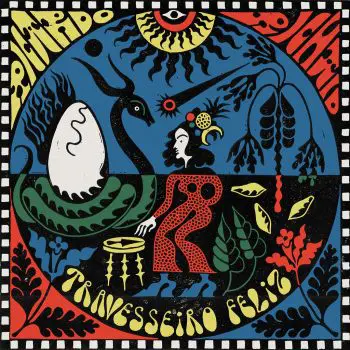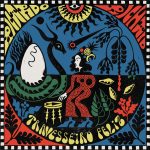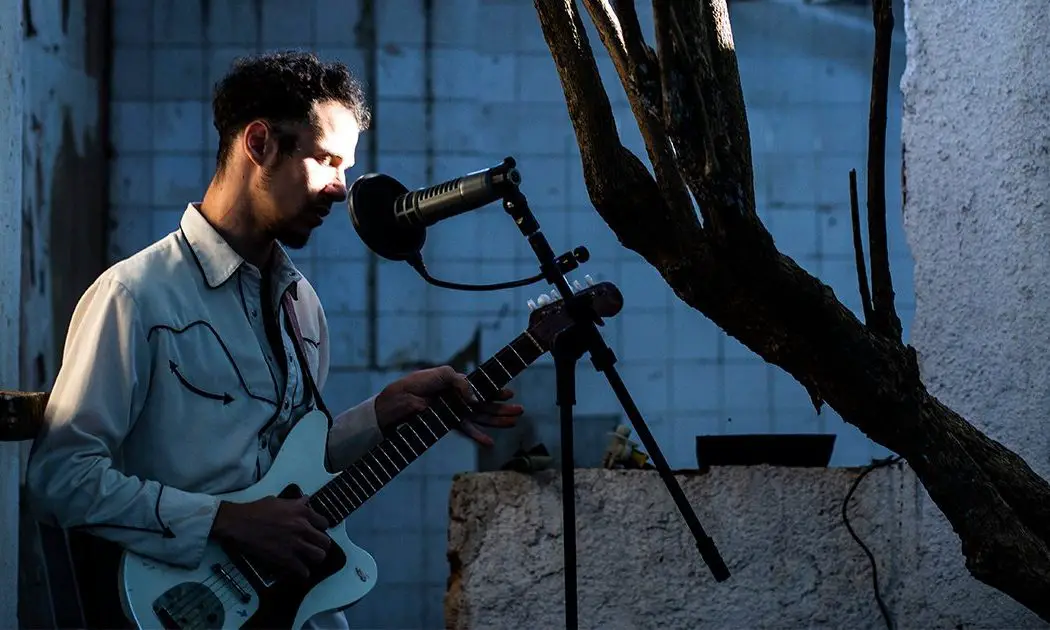A fusion record with a Bossa nova groove and progressive rock instrumentation, ‘Travesseiro Feliz’ by Ricardo Richaid opens our minds to the influence of Brazilian music.
Stream: ‘Travesserio Feliz’- Ricardo Richaid
In many ways Brazil is the South American counterpart to the United States, a vast state with poly-ethnic influences, a dominating sports culture and vibrant arts communities now headed by a conservative government. Many an American music genre has been reproduced in the country of the Amazon and the balneario. Jazz translates to bossa nova, rock translates to tropicalia, country translates to sertanejo and samba reigns as the Brazilian songbook standard. If one is searching for new music, especially one both palpably foreign and yet unmistakably familiar, then most western audiences would do well to consider researching Brazil.

Multi-instrumentalist Ricardo Richaid derives his debut record from this fundamental curiosity; Travesseiro Feliz (happy pillow in Portuguese) is the type of international record people salivate for. Released on British-based label Far Out Recordings, Ricardo Richaid’s debut is at ease both in your Starbucks Cafe or your record player on a Sunday: a fusion record with a bossa nova groove and progressive rock instrumentation; a bid for a new wave “Clube da Esquina” ambiance pioneered by Milton Nascimento and Lô Borges; a Rio de Janeiro record that explores both neo-classical and post-punk elements within a tropicalia idiom.
There are ideas befit for a new-wave Arthur Verocai record and breath taken from the flute of Ian Anderson. Where Anderson strove to marry British folk idioms and blues structures, his product became Richaid’s ingredient, welding native Brazilian music to the schools of British and American art rock.
This all may seem like too many words, too many genres. It is. The digital album is messy and vague. Cuts are overstuffed with instrumental cavalcades and then segue into near a-Capella interludes. It has problems being a repeatable affair: tracks like “Só na Darkzera” and “Maracas Enterprise/Frio da Manhã” tax the listener to extremes that will make repeat listening difficult. Deciphering the record would take a lifetime of research into the music history of Brazil.
But to understand the proggy lexicon of Travesseiro Feliz is to read the cut “Largado Nu” like a Coptic slab with ease, to hear the trifling flute of Bernardo F at the right headphone, synth guitars streaking from the left, an electric guitar crashing over top, an acoustic shooting through, a piano peaking in and a repique drum filling cracks. Each layer reveals another script inherent to the album’s language: jazz, progressive rock, post-punk, neo-classical, Brazillian folk, respectively. When flute returns, uncached from the right stereo, in duet with Richaid’s acoustic guitarwork, the album’s conceit is revealed: this LP will test and tie genres together in a way not seen since Rio de Janeiro during the Seventies.
And because Far Out Recordings decided to compile the tracklist in different orders according to long-play or digital and compact disc, the format is as important to the record’s pacing and mood as the songs. The CD version careens like a turning head on an oceanfront avenue, a tourist distracted by each new happening on the teeming street, a dense attention deficit stream-of-consciousness bouncing between song to interlude with little regard to sonic overload. Repeat listening to the CD version is a harsh experience. However, despite the majority audience being digital consumers, the vinyl edition is listed as the “official” tracklist for the writer’s head because he is actually an old man moonlighting in a young man’s clothes and because the long-player edition of Travesseiro Feliz is cut into two different sides; the hard Side A of “Maracas Enterprise” and “Só na Darkzera” and the softer side of “Ave Apoena” and “O Velho Cai.” The long player is strung along like a performance in the bayside bistro, an open patio affair in two sets made for people-watching the day.
However the softer side does feature a cut the most post-punk of all the tracks, “Drone.” A criss-crossing piece, spliced together from the Kinks’ flatter mono recordings of “Sunny Afternoon” and a room-y sonic befit for Os Mutantes, the record clocks in just under three minutes and is developed into an international new-new-new-new wave anthem that could woo any La Luz fan to smile. For the digital version, Drone is placed within the first quartet of cuts but on the long-player it comes to the fore as the penultimate cut of the album, before the denouement of “Formigas” which features Richaid singing duet with his daughter, Nina.
So yes, this record is a mess of pacing in its digital form- its instrumentation teetering on the edge of maximalism and then overcorrecting into minimalism. Indulge into the happy pillow too much and the mind might reel from its enigmatic lyricism, its light-yet-dark musicality. But given space and distance, each session with this LP-Record affords a new holiday experience in the Terra do Brasil; another new-millennium reading of the “Clube de Esquina” sound pioneered by Milton Nascimento and Lô Borges reflecting a modern Brazil currently in an eerily familiar political throe.
Perhaps we would do well to listen to Richaid’s music even if we don’t quite understand the words. Sometimes the message is just that instantly recognizable.
— — — —

Connect to Ricardo Richaid on
Facebook, Bandcamp, Instagram
Discover new music on Atwood Magazine
? © Far Out Recordings, 2020
Travesseiro Feliz
an album by Ricardo Richaid









